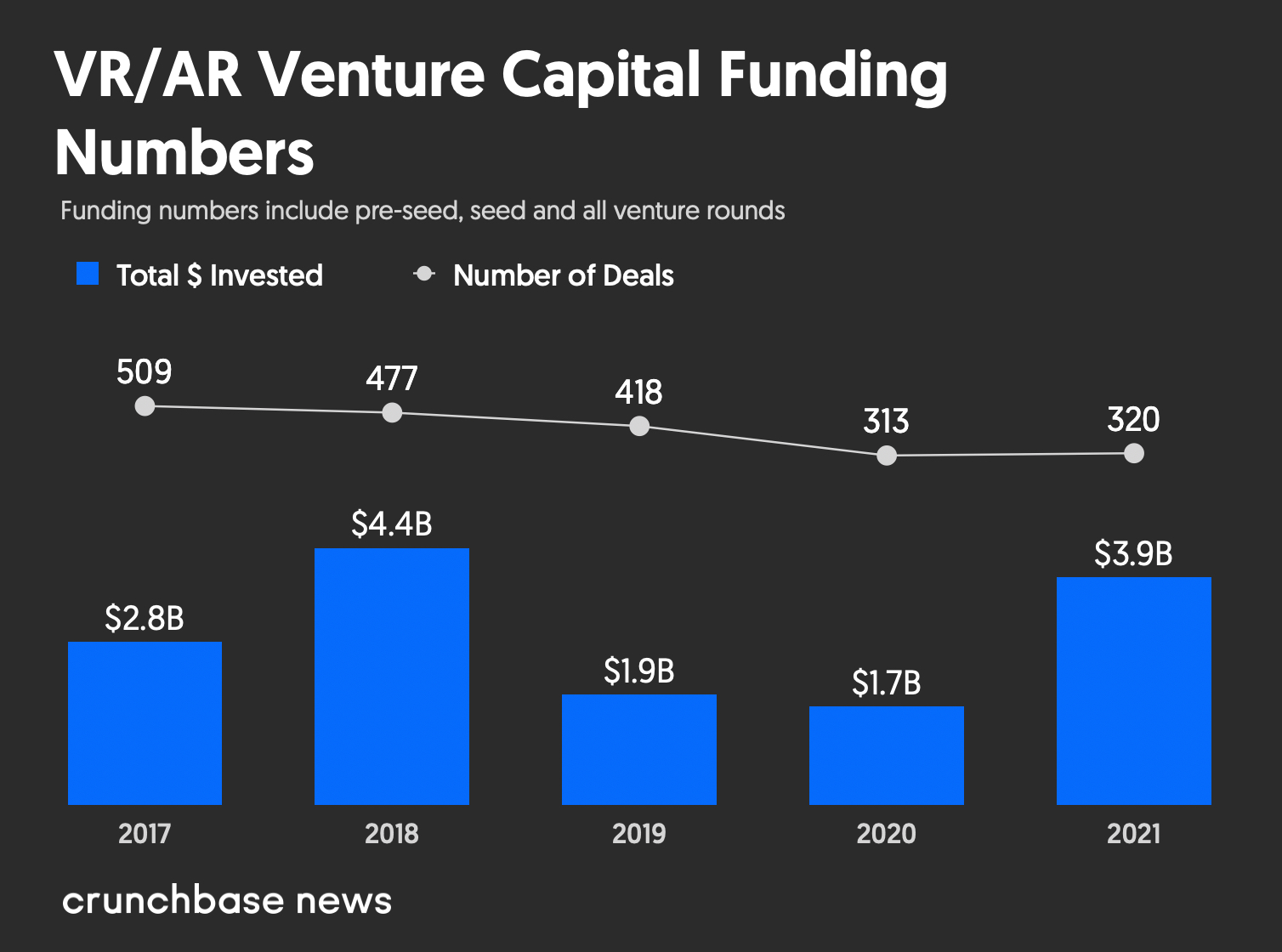Although the term metaverse has been around for nearly 30 years—coined in the novel “Snow Crash”—Facebook’s name change to Meta in late October seems to have reignited investors’ interest in the virtual and augmented worlds that play a role in the concept.
Last year’s fourth quarter was unlike any other as far as venture interest in the VR/AR space. Nearly $1.9 billion of venture capital rolled into startups in the virtual and augmented reality software and hardware space—more than any quarter ever, according to Crunchbase data.
Search less. Close more.
Grow your revenue with all-in-one prospecting solutions powered by the leader in private-company data.
That year-end bump helped make 2021 the second-best year ever for VR/AR investment with nearly $3.9 billion of venture coming to startups—trailing only 2018 which saw nearly $4.4 billion thanks to some large rounds by companies like Magic Leap and SenseTime, according to Crunchbase numbers.

Seven of the top 10 rounds last year occurred in the fourth quarter, including:
- Florida-based wearable tech maker Magic Leap raised a $500 million round in October;
- San Francisco-based Niantic, a builder of augmented reality platforms, closed a $300 million Series D in November; and
- South Korea-based 3D avatar application developer NAVER Z raised a Series B worth approximately $188.2 million, also in November.
Not just the metaverse
While it is easy and convenient to pin the venture funding increase in VR to a catchy term, renewed interest in the space stems from something deeper, say industry insiders.
“I think what you are seeing is the culmination of a 20-, 30-year struggle,” said Josh Sackman, president and co-founder of Van Nuys, California-based AppliedVR.
Sackman said improvements in VR streaming and chips have helped push the industry into new verticals. His company offers virtual reality-based therapeutic treatments to patients, and was one of those raising funding in the fourth quarter, striking a $36 million Series B in November.
Search less. Close more.
Grow your revenue with all-in-one prospecting solutions powered by the leader in private-company data.
Zack Lynch, managing partner at Jazz Venture Partners—which took part in AppliedVR’s Series B—said when he first used VR technology in 2013 he knew it was not ready for the masses. That has changed over the years as technology has improved.
“Right now we definitely think VR is something that will happen,” he said.
Even though acceptance by the general public of VR is likely years away, companies like AppliedVR have proven a workable VR-related business model that does not need the metaverse or some large immersive world, Lynch added.
“Companies like AppliedVR have shown an ability to create value prior to great mass adoption,” he said.
Joel-Oskar Raisanen, investor at GP Bullhound’s venture capital funds, said the basic concept of the metaverse is the amalgamation of one’s digital identity and their more physical place in the world. One can already see that occurring—such as how people take their social media or gaming handle to different platforms over their real names. However, he still sees widespread adoption of life in the VR/AR as a little further off.
“We are still waiting to see the mainstream adoption,” he said. “It’s been somewhat hindered by hardware but we are seeing great progress. It’s still likely not where people thought it would be five years ago.”
Enterprise adoption
When San Francisco-based ManageXR went out to raise money last year, the company did not use the term “metaverse” in its pitch since it was before Meta’s announcement.
“I probably would have if it had been after,” joked Luke Wilson, CEO and founder of the company, which helps companies manage their VR and AR devices through its platform.
Regardless, the company was able to close a $4 million round it announced in December.
The company has grown from about 30 customers—ranging from startups to large enterprises—to more than 100 in about 10 months, as more companies seem intrigued by the idea of using VR in aspects of things like sales, training and onboarding, Wilson said.
Just in October, Accenture, one of the largest consulting firms in the world, announced it would acquire 60,000 Oculus Quest 2 headsets for employee training.
Like others, however, Wilson does not attribute the increase in business and investor interest—since announcing the round he said he receives inbound venture capital interest about “every other day”—just to the metaverse.
Instead, he said he sees the renewed interest as being an offshoot of advances in VR tech, as well as improvement in the quality and affordability of the hardware.
“I don’t see it as just being about the metaverse,” Wilson said. “We are just trying to empower enterprises to use VR, not necessarily live in it.”
Search less. Close more.
Grow your revenue with all-in-one prospecting solutions powered by the leader in private-company data.
Growing the metaverse
Similar to ManageXR’s fundraising story, when Mountain View, California-based Inworld AI pitched investors in the summer, it was before metaverse became a buzzword.
The company, which offers an AI developer platform for immersive realities such as the metaverse, was met with lukewarm reception by some investors, said Ilya Gelfenbeyn, CEO and co-founder.
“In July, investors told us VR was not a sexy topic anymore,” he said. “They said its time was two years ago.”
The company was still easily able to close a $7 million seed round it announced in November, he said. However, since announcing the deal, Gelfenbeyn said the company consistently receives inbound investment interest—so much so it will have another announcement in the next several weeks.
“The interest is just increasing,” Gelfenbeyn said.
While the chatter and headlines about the metaverse certainly help, Gelfenbeyn said he too just sees the increased interest in the space as being part of people’s desire for more immersive experiences. He points to Microsoft’s recently announced $70 billion acquisition of Activision Blizzard as further evidence of that.
“The fundamental tech trend is here for these virtual worlds,” he said.
Methodology
Virtual and augmented reality software and hardware funding numbers include pre-seed, seed and all venture rounds.
Illustration: Dom Guzman

Stay up to date with recent funding rounds, acquisitions, and more with the Crunchbase Daily.












67.1K Followers